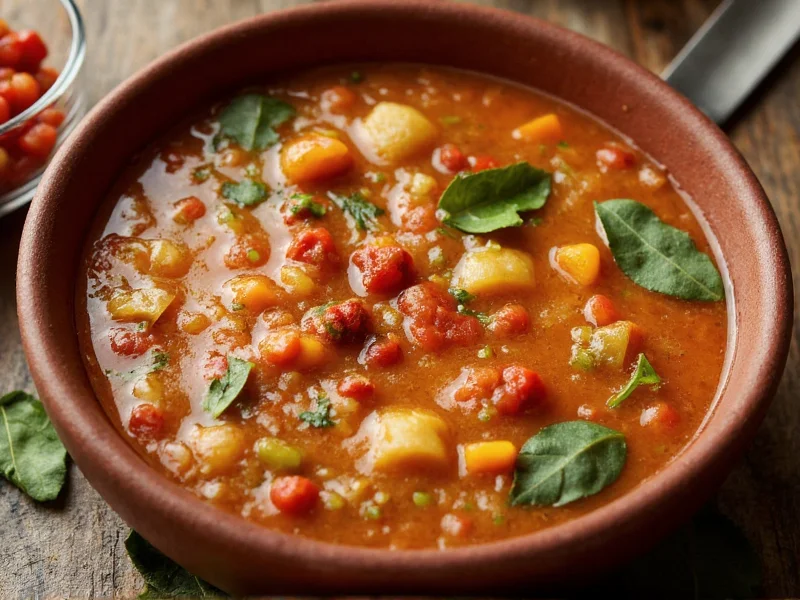As temperatures drop and holiday preparations begin, Christmas soup traditions offer both culinary comfort and cultural connection. These warming dishes serve as more than just starters—they represent centuries-old customs that vary dramatically across continents while sharing common themes of abundance, symbolism, and community.
Global Christmas Soup Traditions
Christmas soup customs reflect regional agricultural practices and historical influences. In Poland, Żurek (beetroot soup) with floating 칮uszka dumplings appears on Wigilia (Christmas Eve) tables as one of twelve meatless dishes. Scandinavians enjoy julskinka soup made from Christmas ham hocks, while Italians serve stracciatella – an egg-drop soup with Parmesan and spinach symbolizing prosperity.
These traditional christmas soup recipes often incorporate ingredients with symbolic meaning. The red color of Polish Żurek represents the blood of Christ, while the shredded greens in Italian stracciatella signify shredded gold for good fortune. Understanding these cultural contexts transforms soup preparation from mere cooking into meaningful holiday ritual.
Three Authentic Christmas Soup Recipes
Polish Żurek with Mushroom Dumplings
This Wigilia tradition requires advance preparation but delivers complex flavors perfect for christmas dinner soup ideas.
Ingredients
| Component | Ingredients | Quantity |
|---|---|---|
| Beetroot Base | Beetroots (cooked) | 4 large |
| Beet kvass or vinegar | 2 tbsp | |
| Sugar | 1 tbsp | |
| Bay leaves | 2 | |
| Mushroom Dumplings | Dried wild mushrooms | 1 oz |
| Onion (finely chopped) | 1 | |
| Flour | 1 cup | |
| Egg | 1 |
Preparation
- Prepare beet broth by simmering cooked beetroots with kvass, sugar, and bay leaves for 45 minutes
- Rehydrate mushrooms in warm water, then sauté with onions until golden
- Mix mushroom filling with flour and egg to form dumpling dough
- Roll dough thinly and cut into small squares for uszka
- Add dumplings to simmering beet broth 10 minutes before serving
Italian Stracciatella alla Romana
This simple yet elegant easy christmas soup recipe originates from Rome's Christmas Eve celebrations.
Key Technique
The secret lies in the egg mixture: whisk 4 eggs with 1 cup grated Parmesan, 1 handful torn spinach, and nutmeg. Slowly drizzle into simmering chicken broth while stirring constantly to create delicate ribbons (stracciatella means “rags” in Italian).
Perfect Pairings for Christmas Soups
Understanding christmas soup pairings elevates your holiday menu planning:
- Bread companions: Serve Polish Żurek with chleb wieczorny (Christmas bread) or Italian stracciatella with crusty ciabatta
- Main course transition: Follow lighter broths with roasted meats; pair heartier pureed soups with fish dishes
- Wine matches: Dry Riesling complements beet-based soups, while Chianti Classico balances tomato-infused varieties
Make-Ahead Strategies for Holiday Success
Master make-ahead christmas soup preparation with these professional techniques:
- Prepare broth bases 3-4 days in advance and freeze in portion-sized containers
- Store dumpling fillings separately from wrappers to maintain texture
- Finish soups with fresh herbs and dairy components just before serving
- Use vacuum sealing for long-term storage of prepared components
These methods ensure your festive holiday soup recipes maintain optimal flavor and texture when time becomes your scarcest holiday resource. Properly stored components can last up to three months, allowing you to focus on holiday enjoyment rather than last-minute cooking stress.
Regional Variations Worth Exploring
Expand your cultural christmas soups repertoire with these lesser-known traditions:
- Scandinavian: Julskinka soup made from Christmas ham hocks with dill and cream
- Czech Republic: Hearty garlic soup (cesnecka) served with fried egg after midnight mass
- Caribbean: Pepperpot soup with cassava, meats, and fiery Scotch bonnet peppers
- Mexico: Pozole rojo with hominy, pork, and garnished with radish and oregano
Each variation tells a story of local ingredients and historical influences, transforming simple ingredients into meaningful holiday expressions. These christmas eve soup traditions often include specific preparation rituals that connect modern families with generations past.
Frequently Asked Questions
What makes a soup specifically a Christmas soup?
Christmas soups typically incorporate seasonal ingredients, cultural symbolism, and preparation methods tied to holiday traditions. Many feature ingredients with religious significance or represent abundance for the coming year. Regional Christmas soups often follow specific dietary rules for Christmas Eve (like meatless dishes in Catholic traditions) and have been passed through generations as part of holiday rituals.
Can Christmas soups be prepared in advance for holiday meals?
Yes, most Christmas soups actually improve when prepared ahead. Broth-based soups like Polish Żurek or Italian stracciatella can be made 2-3 days in advance, with flavors deepening over time. Store components separately (broth, dumplings, garnishes) and combine them just before serving. Many traditional Christmas soups were designed as make-ahead dishes to reduce Christmas Day cooking demands.
Which Christmas soups are traditionally served meatless?
Many Central and Eastern European Christmas Eve traditions feature meatless soups due to religious fasting requirements. Polish Żurek, Lithuanian šaltibarščiai (cold beet soup), and Ukrainian borscht are typically prepared without meat for Wigilia (Christmas Eve) meals. Italian stracciatella is often made with vegetable broth for Christmas Eve. These meatless versions maintain rich flavor through fermented ingredients, mushrooms, and root vegetables.
How do I adjust Christmas soup recipes for modern dietary needs?
Traditional Christmas soups adapt well to contemporary diets. For gluten-free versions, replace wheat flour in dumplings with potato starch. Vegan adaptations work particularly well for beet-based soups using mushroom broth instead of meat stocks. Many historic recipes already feature naturally dairy-free preparations. When modifying recipes, maintain the core flavor profile by preserving key ingredients like beetroots, cabbage, or specific herb combinations that define each soup's cultural identity.











 浙公网安备
33010002000092号
浙公网安备
33010002000092号 浙B2-20120091-4
浙B2-20120091-4